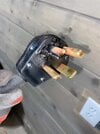While not not a fan of the Bolt, (in fairness I know nothing about the vehicle) I do know a thing or 2 about electricity. Specifically about it's failure characteristics in residential, commercial and industrial infrastructure. It's been my specialty for decades.
It doesn't take an expert to see this. The attached photo shows a Nema 14-30 cord cap. This melted device is specifically attributed to a Chevy Bolt in this article.
Still no fix as GM scrambles 'around the clock' to end Chevy Bolt battery fires
This is a 30-amp, 4-wire device commonly used as a supply to charge EVs. It's the incorrect application but that's irrelevant to this discussion.
There are ZERO chances in 900,000,000 that this failure and whatever risk of fire this failure posed was the fault of GM, a Bolt, or the neighbor's cat. 0 in 18,000,000,000.
This failure has four very specific possible causes or a combination of all 4.
Not 5.
Not Maybe.
FOUR.
1. A loose wire connecting the terminal of the receptacle to that leg.
2. A loose wire connecting the terminal of the cord cap to that leg.
3. A worn out/poor connection between cord cap and receptacle.
4. An overloaded device.
<snip>





